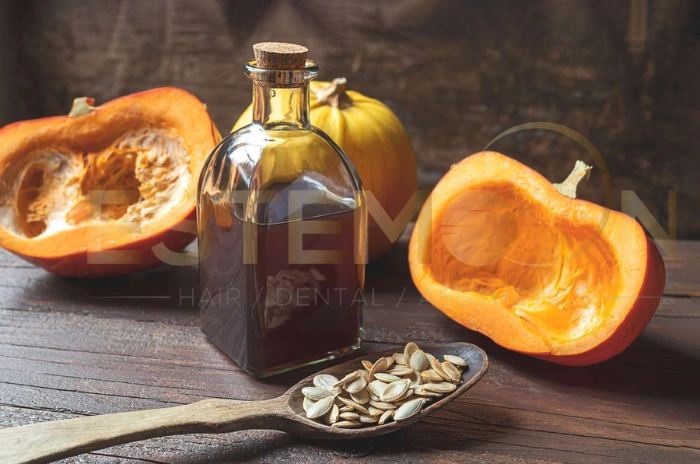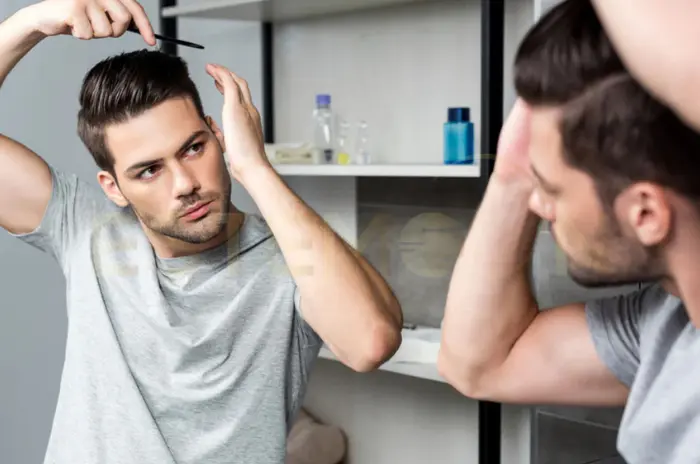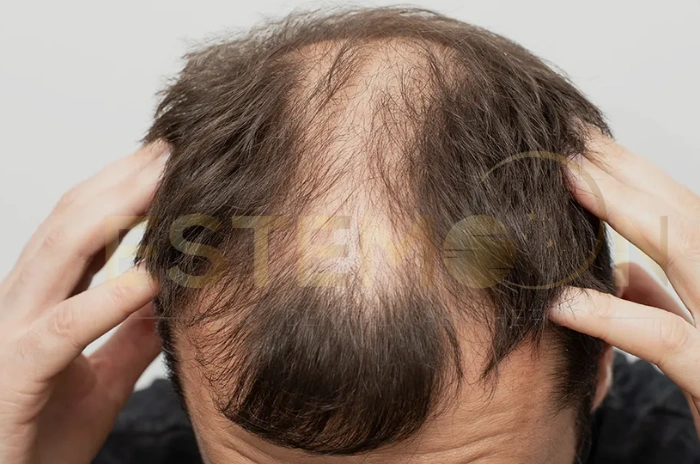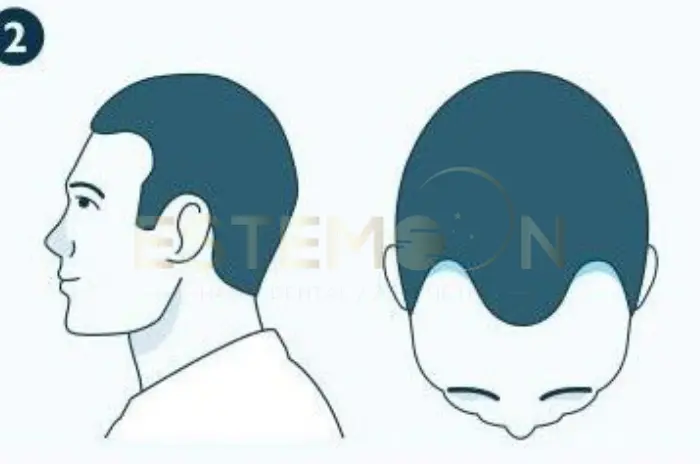Pumpkin seed oil for hair growth has emerged as a promising natural solution for those struggling with hair loss and thinning hair. This nutrient-rich oil, extracted from pumpkin seeds, contains powerful compounds that may help address various hair concerns, from hormonal hair loss to scalp health issues.
Research suggests that pumpkin seed oil benefits for hair extend beyond simple moisturization. The oil’s unique composition of vitamins, minerals, and fatty acids works synergistically to support healthy hair growth while potentially blocking DHT, a hormone linked to androgenic alopecia.
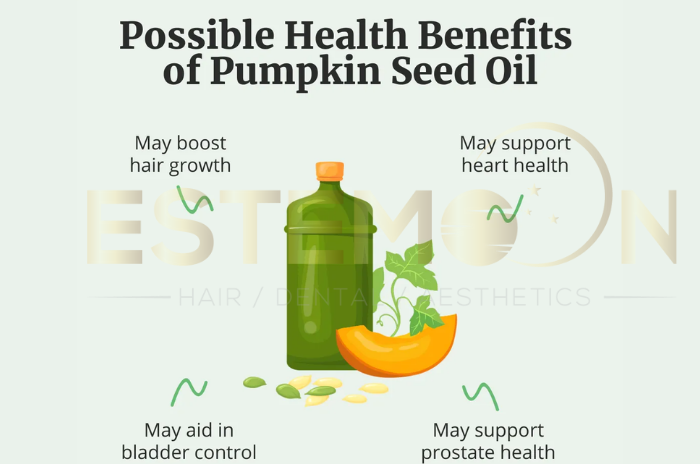
Understanding Pumpkin Seed Oil Benefits for Hair
Pumpkin seed oil for hair loss works through multiple mechanisms that target the root causes of hair thinning and shedding. The oil contains phytosterols, particularly beta-sitosterol, which may help inhibit 5-alpha-reductase, an enzyme responsible for converting testosterone to DHT.
The primary benefits include:
- DHT inhibition: Studies indicate that pumpkin seed oil may reduce DHT levels by up to 40%
- Scalp inflammation reduction: Anti-inflammatory compounds help soothe irritated scalp conditions
- Nutrient delivery: Essential vitamins and minerals nourish hair follicles directly
- Blood circulation improvement: Massage with the oil can enhance scalp blood flow
Scientific Evidence Supporting Hair Growth
Clinical studies have shown promising results for pumpkin seed oil for thinning hair. A 2014 study published in Evidence-Based Complementary and Alternative Medicine found that men taking pumpkin seed oil supplements experienced a 40% increase in hair count compared to the placebo group.
The oil’s effectiveness stems from its ability to:
- Block DHT production at the cellular level
- Provide essential nutrients for keratin synthesis
- Reduce oxidative stress in hair follicles
- Maintain optimal scalp pH balance
Using Pumpkin Seed Oil to Combat Hormonal Hair Loss
DHT blocking pumpkin seed oil offers a natural alternative for individuals experiencing androgenic alopecia. This condition affects both men and women, causing progressive hair thinning due to increased sensitivity to DHT.
Application Methods for Hormonal Hair Loss
Topical application: Apply 2-3 drops of pure pumpkin seed oil directly to the scalp, focusing on areas of thinning. Massage gently for 5-10 minutes to ensure absorption.
Hair mask treatment: Mix pumpkin seed oil with carrier oils like jojoba or coconut oil. Apply to scalp and hair, leave for 30 minutes, then shampoo thoroughly.
Supplement form: Pumpkin seed oil capsules for hair provide systemic support. Take 400-1000mg daily with meals for optimal absorption.
Timeline for Results
Most users report initial improvements within 8-12 weeks of consistent use. Significant changes in hair density and thickness typically become visible after 4-6 months of regular application.
How to Use Pumpkin Seed Oil for Optimal Hair Health
How to use pumpkin seed oil for hair depends on your specific hair concerns and lifestyle preferences. The oil can be incorporated into existing hair care routines or used as a standalone treatment.
Daily Application Protocol
Morning routine: Apply 2-3 drops to clean, damp scalp. Style hair as usual without rinsing.
Evening treatment: Massage oil into scalp before bedtime. Cover with a silk pillowcase to prevent transfer.
Weekly deep treatment: Apply generous amount to scalp and hair, cover with shower cap, leave for 1-2 hours before washing.
Combining with Other Treatments
Pumpkin seed oil works synergistically with:
- Rosemary oil for enhanced circulation
- Saw palmetto for additional DHT blocking
- Biotin supplements for keratin production
- Scalp massage tools for improved penetration
Safety Considerations
While generally safe, patch test before first use. Discontinue if irritation occurs. Pregnant and nursing women should consult healthcare providers before use.
Pumpkin Seed Oil as a Potential Minoxidil Alternative
Minoxidil vs pumpkin seed oil comparisons reveal both similarities and differences in effectiveness and side effects. While minoxidil remains the gold standard for hair regrowth, pumpkin seed oil offers a natural alternative with fewer adverse effects.
Effectiveness Comparison
| Factor | Minoxidil | Pumpkin Seed Oil |
|---|---|---|
| Hair regrowth rate | 60-70% of users | 40-50% of users |
| Side effects | Common (scalp irritation, unwanted hair growth) | Minimal (rare allergic reactions) |
| Cost | Moderate to high | Low to moderate |
| Natural origin | Synthetic | Natural |
| Long-term safety | Well-studied | Limited long-term data |
Advantages of Pumpkin Seed Oil
Pumpkin seed oil for androgenic alopecia offers several benefits over conventional treatments:
- No known systemic side effects
- Suitable for sensitive scalps
- Additional nutritional benefits
- Can be used long-term without dependency concerns
When to Consider Alternatives
Consider pumpkin seed oil if you:
- Experience side effects from minoxidil
- Prefer natural treatment options
- Have early-stage hair loss
- Want to supplement existing treatments
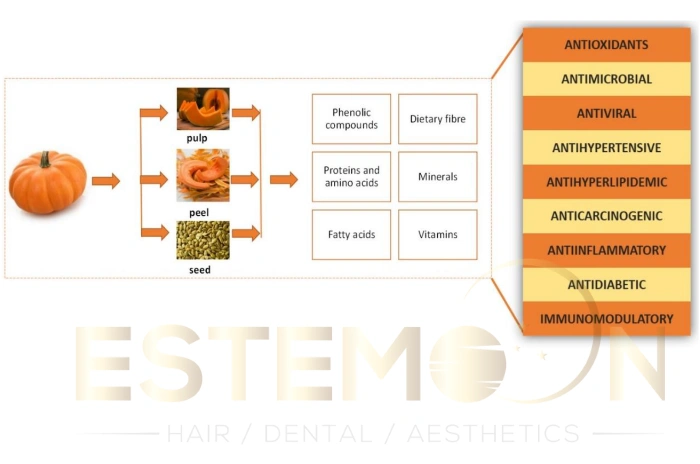
Nutrients in Pumpkin Seed Oil: Zinc, Omega-3, and Vitamin E
Zinc for hair growth plays a crucial role in protein synthesis and cell division, both essential for healthy hair development. Pumpkin seed oil contains high concentrations of bioavailable zinc, making it an excellent source for addressing zinc deficiency-related hair loss.
Key Nutritional Components
Zinc content: Each tablespoon provides approximately 2.2mg of zinc, supporting:
- Keratin production
- Hair follicle health
- Immune system function
- Wound healing
Omega-3 and omega-6 for hair: These essential fatty acids maintain:
- Scalp barrier function
- Hair shaft integrity
- Moisture retention
- Anti-inflammatory responses
Vitamin E for hair health acts as a powerful antioxidant, protecting hair follicles from:
- Free radical damage
- UV radiation effects
- Environmental toxins
- Premature aging
Nutritional Profile Breakdown
The oil’s comprehensive nutrient profile includes:
- Phytosterols: 1,000-2,000mg per 100g
- Tocopherols: 30-50mg per 100g
- Carotenoids: Natural antioxidants for scalp protection
- Minerals: Iron, magnesium, phosphorus for follicle support
Bioavailability and Absorption
Topical application ensures direct delivery to hair follicles, bypassing digestive system limitations. The oil’s molecular structure allows for efficient penetration through the scalp barrier.
How Pumpkin Seed Oil Can Reduce Hair Shedding
Pumpkin seed oil for hair shedding addresses excessive hair loss through multiple pathways. Normal shedding ranges from 50-100 hairs daily, but stress, hormones, and nutritional deficiencies can increase this significantly.
Mechanisms of Shedding Reduction
Scalp nourishment oil properties help by:
- Strengthening hair shaft structure
- Reducing follicle inflammation
- Balancing sebum production
- Improving nutrient delivery to roots
Anti-inflammatory scalp oil effects include:
- Reduced prostaglandin D2 levels
- Decreased inflammatory cytokines
- Improved follicle microenvironment
- Enhanced cellular repair processes
Clinical Evidence for Shedding Reduction
Studies demonstrate that regular use of pumpkin seed oil for women’s hair loss can reduce excessive shedding by:
- 30-40% within 8 weeks
- Improved hair shaft diameter
- Increased anagen (growth) phase duration
- Better overall hair quality metrics
Improve Scalp Blood Circulation Benefits
Enhanced circulation delivers:
- Oxygen to hair follicles
- Essential nutrients for growth
- Waste product removal
- Improved cellular metabolism
Application Techniques for Maximum Benefit
Massage method: Use fingertips to apply oil in circular motions, increasing pressure gradually.
Brush stimulation: Apply oil then brush with natural bristles to distribute evenly.
Heat treatment: Warm oil slightly before application to enhance penetration.
FAQs About Pumpkin Seed Oil Benefits for Hair Growth and Health Guide
How does pumpkin seed oil help hair?
Pumpkin seed oil benefits for hair include DHT blocking, providing essential nutrients like zinc and omega fatty acids, reducing scalp inflammation, and improving blood circulation to hair follicles.
Can pumpkin seed oil block DHT effectively?
Studies show that DHT blocking pumpkin seed oil can reduce DHT levels by up to 40% through its phytosterol content, particularly beta-sitosterol, which inhibits 5-alpha-reductase enzyme activity.
What is the best way to use it?
Apply 2-3 drops of pumpkin seed oil for hair growth directly to the scalp daily, massage for 5-10 minutes, and leave in overnight or for at least 30 minutes before washing.
Does it work as well as Minoxidil?
While minoxidil vs pumpkin seed oil studies show minoxidil has higher success rates (60-70% vs 40-50%), pumpkin seed oil offers a natural alternative with fewer side effects and can be used as a complementary treatment.
Follow us on social media for updates, tips, and patient success stories:

